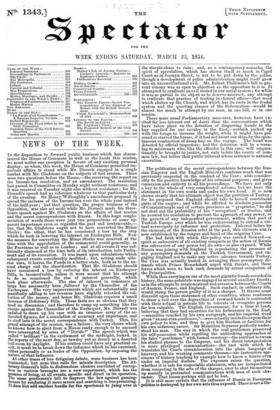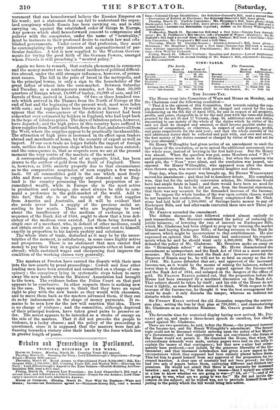The publication of the secret correspondence between the Rus- sian
Emperor and the English Ministers confirms much that was previously suspected in the conduct of the Czar; adds consider- ably to the positive knowledge of his criminal purposes ; and gives connexion and entirety to all his proceedings. We have not only a key to the whole of very complicated actions, but we have the statement in his own words and under his own hand. It is now shown clearly that his ultimate object was the partition of Turkey ; for he proposed that England should take to herself constituent parts of the empire ; and while he affected to disclaim possession
of Constantinople and of certain provinces as "proprietor," he did not shut out the probability of his " occupation " as trustee, and he avowed his resolution to prevent the approach of any power, or the growth of any independent government, within that part of Turkish Europe over which he was endeavouring to extend a vir- tual sovereignty by influence and protection. Inferred before by the elements of the Russian orbit in the past, this ultimate aim is now established by the tongue and hand of the reigning Czar. The bad faith with which this policy was carried forward—a spirit as subversive of all existing compacts as the action of Russia was subversive of any power but its own—is also exposed. While Russia was joining with England in reprobating the pressure of any peremptory demands on the Turkish Government, and en- gaging England not to make any active advance towards Turkey, the Czar was actually busied in arranging those peremptory de- mands which Prince Meuschikoff urged with threats, and those forces which were to back such demands by actual occupation of the Principalities. While thus carrying on one of the most gigantic frauds recorded in history, the same potentate was engaged in several auxiliary frauds; as in the attempts to create mistrust and aversion between the Courts of Austria, France, and England. Such conduct, in ordinary life, would stamp the person guilty of it as a sharper. It throws some discredit upon those statesmen of other countries, whose readiness to draw a veil over the depravities of crowned heads is contrasted with their refusal in private life to tolerate or recognize persons far less culpable. The English Government, for a time at least, believing that they had securities for his forbearance in the East, —securities vouched by his own autograph, and his imperial word given "en ami et en gentleman,"—were actually incited to expose their own policy to him, and thus to give him freedom or facilities for his own nefarious career. Sir Hamilton Seymour perfectly under- stood his man. The way in which the real gentleman preserved his self-possession while repelling the unblushing approaches of the false " gentleman " with formal courtesy—the contrast between his studied phrases to the Emperor, and his direct interpretation in more privileged communications—the tact with which he translates the Czar's circuinlocution into the plain language of knavery, and his warning comments thereon—are instructive spe- cimens of history teaching by example how to know a knave even under an imperial diadem. The exposure raises the question, whether it is safe for respectable statesmen, who are incapacitated from competing in the arts of the sharper, ever to shut themselves up secretly in protracted communications with men of such cha- racter. That lesson perhaps will not be lost. It is still more certain that the influence of Russia in European politics is destroyed by her own acts thus exposed. There is not a Go-
vernment that can henceforward believe the Russian Emperor on his word ; not a statesman that can fail to understand the organ- ized conspiracy which Russia has been carrying on, and is still carrying on, against the established order of things in Europe. Any powers which shall henceforward consent to compromise and palaver with the conspirator, under the name of "neutrality," must be insincere in their professed desire to sustain law and esta- blished governments. Under cover of that profession, they must be contemplating the petty interests and aggrandizement of par- ticular families. A test is now supplied to the Western Govern- ments for trying the good faith of the German Powers, amongst whom Prussia is still preaching:a "neutral policy."



































 Previous page
Previous page